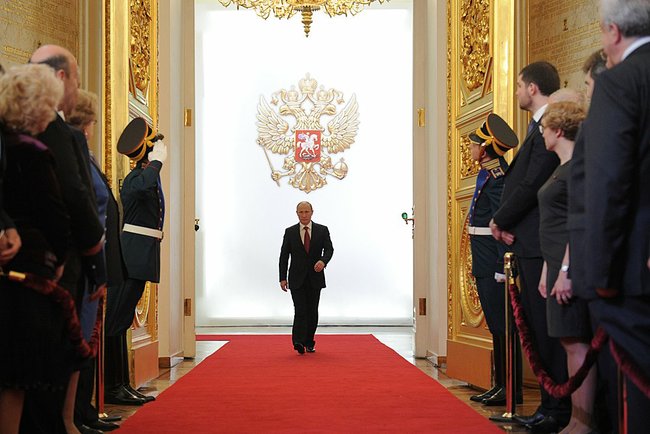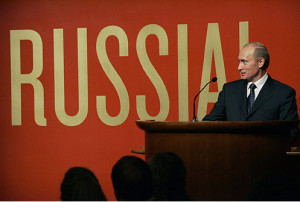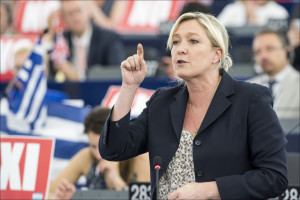Divide and Rule

At the Munich Security Conference, Sergey Lavrov, Russia’s Minister of Foreign Affairs, called for a “post-West world order.” It was a euphemism for what the Kremlin envisions for the future; a future that Russia is actively working to achieve. Russian foreign policy is driven by Putin’s notion of national exceptionalism. According to Mark Galeotti and Andrew Bowen, Putin sees himself as “defending a civilization against the “chaotic darkness” that will ensue if he allows Russia to be politically encircled abroad and culturally colonized by Western values at home.” His foreign policy aims at weakening and disuniting the European Union, having ideologically sympathetic foreign allies, and dismantling NATO.
It is in this context that one must understand Russia’s long established a strategy of promoting Russian interests and legitimising its behaviour at home and abroad. Until recently, this public diplomacy was considered a failure; Russia’s image was worsening. However, as populism grows in the West, these efforts are now paying off.
Involvement in Western Elections

http://bit.ly/2l1Op1K
Russia is now using a consequential tool to wield its influence abroad: cyber-attacks. In the United States, the Kremlin interfered with the 2016 presidential election by hacking the Democratic National Committee’s computers and those of Clinton’s campaign, and subsequently feeding the obtained information to Wikileaks. A report by the US intelligence community asserts that “Putin and the Russian Government aspired to help President-elect Trump’s election chances when possible by discrediting Secretary Clinton and publicly contrasting her unfavourably to him” using a “strategy that blends covert intelligence operations—such as cyber activity—with overt efforts by Russian Government agencies, state-funded media, third-party intermediaries, and paid social media users or “trolls.”
Similarly, two weeks ago, Emmanuel Macron’s campaign manager accused Russia of interfering with the French presidential race by hacking the “En Marche” movement’s IT infrastructure including its database and email servers. While the hacking has been confirmed, its authors have not been identified. Nevertheless, the timing of the cyber-attacks is ideal: Macron has gained momentum these past months, and as he is one of Marine Le Pen’s main contenders in the presidential bid, she would have a better chance at winning the election. Contrary to Le Pen, Macron favours a strong and united Europe. Given the Front National’s emphasis on sovereignty and national identity, law and order, it supports the exit of the European Union, the euro and NATO, the rejection of gay marriage and immigrants. It is no surprise that Le Pen admires Putin or that Russia would be interested in securing her victory.
Networks of Influence
A report by the Atlantic Council last year, entitled “The Kremlin’s Trojan Horse”, argues that Russia’s destabilization tactics in Western countries are two-fold: “(1) building political alliances with ideologically friendly political group and individuals, and (2) establishing pro-Russian organizations in civil society, which help to legitimate and diffuse the regime’s point of view.”

https://flic.kr/p/vsuabv
In France, this translates into a loan of nine million euros in 2014 to the Front National, Marine Le Pen’s party. The Front National is the only French political party that approved Russian annexation of Crimea. Building relationships with the Putin administration, party officials have made regular visits to Moscow. Others also travelled to Crimea, Donetsk and the Donbass. Some members of the French right-wing party, Les Républicains, also hold strong pro-Russian views and made a trip to Crimea in the summer of 2015. Among them, Thierry Mariani presides the Dialogue Franco-Russe, an organization in charge of encouraging economic, political and cultural relationships between the two countries. There is also the Institute for Democracy and Cooperation, a think-tank that promotes Russian interests.
In the United Kingdom, the far-right views align well with those of the Russian government. The right-wing populist party, UKIP, and its leader Nigel Farage, strongly reject immigration and emphasize sovereign democracy. The destabilising effect created by Brexit, which UKIP strongly advocated, was certainly welcomed by Moscow. Farage has also defended Russian actions in Ukraine and his criticism of anything that relates to the European Union, its political institutions, and foreign policy, makes him an ideal publicist, of the Kremlin.
In Germany, “Russia has widespread influence in Germany, based on close economic, political and personal ties” says the Financial Times. Economically, Germany is highly dependent of Russian sources of energy such as oil and gas. There are also important organisations that animate bilateral relations. The German-Russia forum and the Petersburg dialog are the main ones. Politically, he SPD has naturally a culture of appeasement and conciliation with Russia that dates back to the Cold War. To the right, the far-right populist party, the AfD is supported by the Russian government. Its ideas are openly anti-immigration, Euro-sceptic, and Russian-friendly; the AfD’s youth arm is now establishing formal relationships with its counterpart at Putin’s United Russia party.
“Weaponizing” Information
Sinikukka Saari, a special advisor to the Finnish Ministry for Foreign Affairs of Finland explains that “the covert techniques of Soviet PD included planting disinformation in the Western media, […] to advance Soviet foreign policy goals.” This practice seems oddly familiar: Russian state medias, such as Sputnik and Russia Today, are channeling both pro-Russian voices and twisting facts to make them more favourable to Russian interests. The report by the US intelligence community mentions that “Russia, like its Soviet predecessor, has a history of conducting covert influence campaigns, focused on US presidential elections, that have used intelligence officers, agents, and press placements to disparage candidates perceived as hostile to the Kremlin.”
In France, Nicolas Dhuiq, a politician and member of Les Républicains, recently told Sputnik that Macron was “an agent of the big American banking system” and declared that there is “wealthy gay lobby behind him.” Macron’s campaign manager also suspects the Russian media of spreading fake news and alternative facts in an attempt to discredit him. A Russian newspaper, Izvestia, announced that Julian Assange the founder of Wikileaks, would have compromising information on Emmanuel Macron .
In Germany, the “Lisa case” is another example of Russian media’s role in propagating fake news. Lisa is a Russian-born youngster living in Germany, who claimed to have been abducted and raped by immigrants. Before the prosecution could complete its investigation (and conclude that this claim was untrue), the Russian media relayed the story and the damage was done. These typically contribute to both legitimatize the ideas of the German far-right party – the AfD – and weaken Merkel’s political position. The Financial Times writes that “an electoral defeat for Ms. Merkel – or even a serious setback – would be a huge victory for Russian president Vladimir Putin. He is keen to break western unity on the sanctions imposed over Russia’s aggression in Ukraine and annexation of Crimea unity largely orchestrated and upheld by Ms. Merkel.”
The Tide is Turning
The inability of Western leaders to effectively respond to the effects of globalisation (most importantly, the waves of immigration, the threat of terrorism and the economic crises) contributed to the rise of populism – a breeding ground for Russian influence. By contrast, in the East, Russia does not seem to be losing itself in globalisation. While European countries are perceived as meek when challenged, Putin displays strength and appears to have control over Russia’s fate. Russia is waging war against the Western liberal order and values, and this is not good news.
